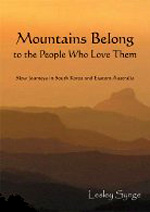Mountains Belong to the People Who Love Them: Slow Journeys in South Korea and Eastern Australia by Lesley Synge
Post Pressed, 2011
This collection of poetry, prose and photographs begins with a full-page preface about the author, Lesley Synge, indicative of the very personal narration throughout the book. Synge takes as inspiration her trips to Duncheol (in South Korea) and along the Gold Coast Hinterland Great Walk. This 2011 edition is an expanded version of an earlier work with the same title, including new poems and prose written in Australia and a revision of Synge’s poems written in Korea. The structure of the book reflects the two journeys taken by Synge, with the first half focusing on Korea and the second on Australia, and it is informed by Synge’s strong identification with Buddhist teachings.
Comprising poems written in the haiku form, the section on Korea contains mainly pieces which are intensely lyrical and take rural or more natural landscapes as their subject matter. Short poems frequently appear on a page of their own and defy conventional publishing formats. The poems appear in different parts of the page, be it the top right-hand corner or near the centre-fold at the bottom of the page. This deliberate presentation, with its expanses of white space, indicate the reflective nature of the poems and often require the reader to slow down, an important aspect of Synge’s slow journeys.
Often untitled, these short poems range in subject. For example, one page has in the top left-hand corner:
Korean poets – I see your dilemma: rice is too beautiful for words, and barley won’t stop dancing.
Then another in the bottom right-hand corner of the same page:
The languid dang ... dang ... of a distant temple bell – why am I lonely?
Before finishing with the following in the middle of the next page:
Today, blank. Nothing impressed me. I breathed in and out, I guess. Someone else wrote a poem.
The multiple references from Korean poets in this untitled sequence, and the idea of connection through community, as well as a poem that negates its own existence – ‘Someone else wrote a poem’ – demonstrate the way in which Synge as a poet includes her own everyday experiences. Indeed these experiences are what Synge uses to create a kind of everyday sacred:
In my quiet room, I read and write, a tin of imported Cavendish and Harvey Sour Lemon Drops at my side. I suck one yellow disc after another. I cannot stop, I observe. How far from liberation I am. Still, and I reach for yet one more, I am content.
Here Synge offers the reader a spiritual contentment through the everyday experience of sucking a hard lolly. The tension between the act of consumption and the condemnation of that consumption presents knowledge of the persona’s own fallible nature. The persona’s acceptance of this fallible nature, as evidenced by the assertion ‘I am content’ allows Synge to convey a kind of spiritual acknowledgement of her own imperfect nature, thus creating a sacred moment out of an everyday action and dilemma.










